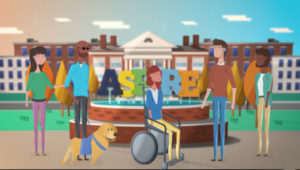When UMW junior Lueden Sheikhnureldin arrived at Simpson Library that early fall morning, something felt off. The old-style wooden chairs in the study area where she’d crammed for so many exams had been replaced by sleek gray-and-green seats.

UMW’s Office of Disability Resources offers access to students in need, with 12 percent of students registered to receive its services. This month, the University is celebrating the 30th anniversary of the Americans With Disabilities Act of 1990.
“I couldn’t concentrate,” said Sheikhnureldin, whose ADHD can cause sensitivity to details like a chair’s texture and feel. “I thought, ‘This is confusing. Everything is changing. I can’t do this.’” She retreated to her Madison Hall room, instead, to study for a biology test.
An English major pursuing a degree in education, Sheikhnureldin is one of hundreds of UMW students with disabilities ranging from ADHD and autism to issues with vision, hearing and movement. “There really isn’t a category that isn’t represented here,” said Jessica Machado, director of the Office of Disability Resources (ODR), which provides services, accommodations and access.
It’s one of the most utilized offices of its type in Virginia, Machado said, with 12 percent of Mary Washington’s more than 4,000 students registered. That’s particularly poignant this month, while the Americans with Disabilities Act (ADA) celebrates its 30th anniversary. UMW officials like Machado are using the milestone to recognize three decades of strides toward equality for the disabled and also the work left to do.
“We must directly challenge the assumptions and effects of ableism and work to ensure that every member of the UMW community can realize their goals and aspirations here, and that all of us together thrive and flourish,” Provost Nina Mikhalevsky wrote in an email to campus. Read more.